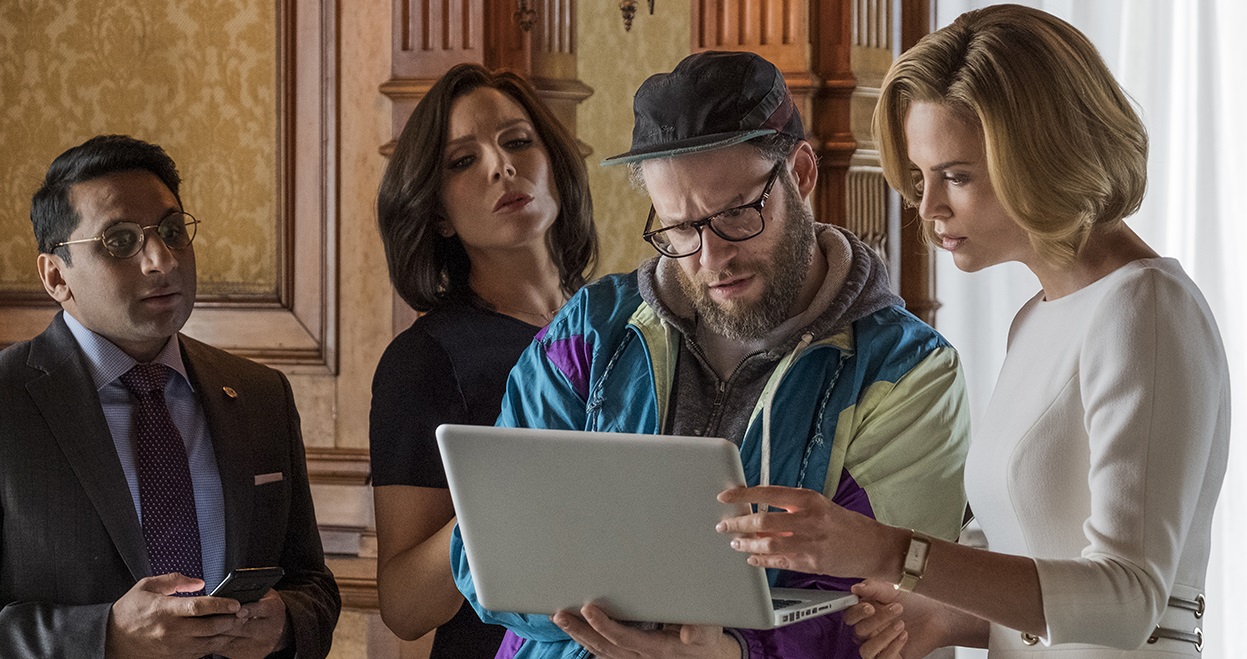At the Edinburgh Filmhouse from Fri 17 May 2019
Comedians and satirists have never had it quite so easy – or quite so hard. With the state of world politics in general (and the US government in particular) throwing up so many doozies every day, there are richer pickings for humourists to work with than in living memory. At the same time, parodying that which is already absurd to the extreme can pose problems of its own, none of which are made easier by the climate of blame, offence and extreme sensitivity in which we now live.
Enter Long Shot, the latest collaboration from director Jonathan Levine and leading man Seth Rogen. Here, Rogen plays Fred Flarsky, opinionated lefty and scribbler for an independent news outlet that has just been gobbled up by the machine. On the night he jacks in his job, he runs into old acquaintance Charlotte Field (an impeccable Charlize Theron), his erstwhile babysitter and now US Secretary of State. On a whim, Charlotte hires Fred to punch up her speeches in her upcoming run for the presidency, before their relationship soon develops into something altogether less professional.
So far, so screwy. Rogen and Theron together is the perfect (if well-trodden) set-up for a goofball comedy, even without the other narrative obstacles which make their union supremely unlikely. But is it just a goofball comedy? While Rogen’s presence pretty much guarantees toilet gags and stoner trappings in abundance, this film feels like it’s aiming slightly higher; a longer shot, a 3-pointer rather than a slam dunk. This is where those aforementioned rich pickings come sailing into play.
The screenplay, a joint effort between Liz Hannah (The Post) and Dan Sterling (The Interview), takes on a whole host of political and societal issues in its sprawling, scattergun approach of heavy-handed haymakers and half-baked caricatures. Among others, public figures like Donald Trump, Justin Trudeau and Rupert Murdoch are mocked with unsubtle impishness, while a wide variety of topics, from environmental urgency to sexist hypocrisy to corporate corruption, are all given a once-over. And there’s the trouble… it really is just a once-over, a cursory nod to the Zeitgeist in a film which has no real room to accommodate one.
Not to say that addressing the issues mentioned above have no place in cinema, or even comedic cinema. It’s just that weighty discussions about the dehumanisation of opposition parties or the difficulties of womanhood in a male-dominated society feel a little out of place in a movie that contains a scene in which Rogen ejaculates onto his own face and Theron de-escalates a potentially volatile international conflict while off her head on MDMA. It’s kind of like if Dumb and Dumber had side-tracked into a diatribe about parakeet brutality or Super Troopers went off on an earnest tangent about police incompetency. There’s undoubtedly a time and a place for all of these platforms, but their Venn diagrams probably shouldn’t overlap.
And that’s Long Shot’s biggest problem: it doesn’t know what it wants to be. The love story between Rogen and Theron is genuinely sweet and surprisingly believable, despite everything against it. The lowest common denominator gags come fast and furious, and though not all of them stick to the wall, some strands certainly do. And the points about compromise versus idealism, sexual discrimination and political tribalism (among others) are salient, but not given enough depth or the right context to really provoke thought. Not to mention that the predictable story arc often serves to undermine the very issues is seeks to address. As such, Long Shot remains a chimeric and ambitious attempt at a different type of film for Levine and for Rogen, but one in which neither is able to fully escape their habits of old or reconcile them with the new.
